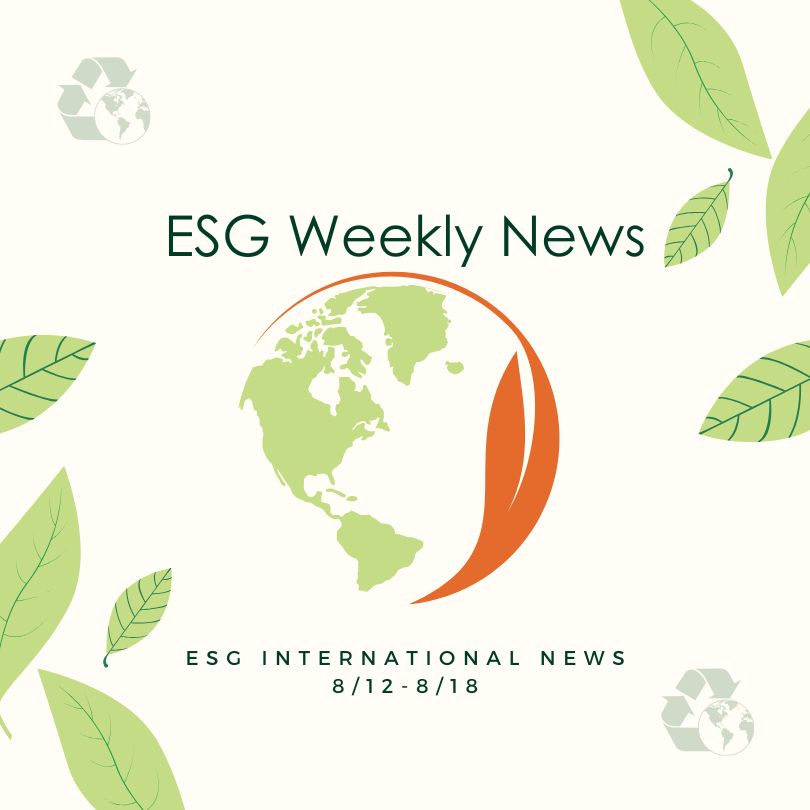- Home
- News
- ESG Weekly News
- ESG International Weekly News 8/12 -8/18
ESG International Weekly News 8/12 -8/18

1.🌍 UN Plastic Pollution Treaty Talks Stall Again
The UN’s latest 10-day round of negotiations (INC-5.2) in Geneva ended without consensus, though nations pledged to continue working toward a legally binding treaty to tackle plastic pollution. Over 2,600 participants—including 1,400 delegates from 183 countries and nearly 1,000 observers from 400+ organizations—took part.
Key sticking points remain around plastic design standards, chemicals of concern, production caps, and financing & compliance mechanisms. Deep divides persist, especially on binding production limits and funding support for developing nations.
Civil society groups—including Indigenous leaders, waste pickers, scientists, youth activists, and artists—kept pressure high with protests, installations, and media actions. UNEP warned that plastic pollution is now found “in groundwater, soil, rivers, oceans, and even in our bodies.”
UNEP’s Inger Andersen said all countries remain committed to staying at the table, while WWF’s Erin Simon criticized the lack of progress: “This breakdown means the plastic crisis continues unchecked. The world can’t wait any longer—protecting people and planet is non-negotiable.”
The process, launched in 2022 under UNEA Resolution 5.2, aims for a final treaty text to be adopted at a future diplomatic conference. However, the timeline remains uncertain.
Highlights:
-
183 nations, 2,600 total participants in Geneva
-
Four core debates: design, chemicals, production caps, financing/compliance
-
Strong civil society presence—Indigenous, youth, and activists
-
No agreement → process delayed, future session TBD
-
WWF warns: “No more excuses—urgent action is needed”
2.🪴 IKEA’s Ingka Group Makes First Circular Investment in China with Recycler Re-mall
Ingka Investments, the investment arm of IKEA’s Ingka Group, has made its first circular economy investment in China, backing Shanghai-based Re-mall, a recycler specializing in converting post-consumer food packaging waste into transparent recycled polypropylene (rPP).
Re-mall’s proprietary process addresses contamination, material degradation, high costs, and demand fluctuations—making it one of the few global players producing transparent rPP pellets at scale. Applications span packaging, household products, toys, textiles, and cosmetics, already used by several multinational brands.
Lukas Visser, Head of Circular Investments at Ingka Group, noted: “By investing in Re-mall, we want to amplify their impact and accelerate solutions to the global plastic waste problem.”
China, as one of the world’s largest plastic markets, is seen as central to scaling circular solutions. Re-mall’s Jiangxi facility connects to major waste streams from Shanghai and Guangzhou, and the funding will expand recycling capacity and new product development.
IKEA China’s President & CSO, Pontus Erntell, said this move underscores a long-term commitment to China’s circular transition. Re-mall CEO Zhu Kuan called the partnership a “milestone in transforming plastic waste into valuable resources.”
This move complements Ingka’s European stake in Morssinkhof Rymoplast, strengthening its global recycled materials strategy and emissions reduction goals.
Highlights:
-
First Ingka circular economy investment in China
-
Focus on high-quality rPP from food packaging waste
-
Expands Re-mall’s recycling capacity and product development
-
China positioned as key market for circular transformation
-
Aligns with Ingka’s global recycled plastics and CO₂ reduction strategy
3.♻️ Alliance to End Plastic Waste Launches 2024 Progress Report & Strategy 2030
The Alliance to End Plastic Waste (AEPW) has released its Progress Report 2024: Evolving for Impact, marking five years of action and launching Strategy 2030 to scale circular solutions globally.
Since 2019, AEPW-backed projects have:
-
Diverted 239,985 tonnes of unmanaged plastic waste
-
Recycled/repurposed 253,212 tonnes
-
Created 2,134 formal jobs
-
Attracted US$610.89M in external funding
The new approach will shift from multiple smaller projects to large-scale, integrated programs, beginning with India, Indonesia, and South Africa, each backed by at least US$100M in financing. Priority focus: tackling flexible plastics, one of the hardest-to-recycle waste streams.
President & CEO Jacob Duer said: “We are doubling down on what works to drive impact at scale.” Board Chair Tracey Campbell added that aligning industries, governments, and communities around proven solutions can accelerate real progress.
The Alliance will leverage blended finance and public-private partnerships to expand recycling infrastructure, aiming to deliver systemic transformation through innovation, capacity building, and financial leverage.
Highlights:
-
5 years → 240k tonnes waste eliminated, 253k tonnes recycled
-
Strategy 2030: focus on India, Indonesia, South Africa (≥ US$100M each)
-
Priority: flexible plastics
-
Blended finance + PPPs to unlock large-scale investment
-
Goal: accelerate global transition to a circular plastics economy
4.📈 SBTi Reports 227% Surge in Firms Setting Climate Targets
The Science-Based Targets initiative (SBTi) has reported a 227% increase in companies setting both near-term and net-zero climate targets between late 2023 and mid-2025, signaling a decisive shift toward long-term climate strategy. Companies setting only near-term goals nearly doubled in the same period.
Asia is the growth engine, with a 134% rise in validated companies—led by China’s 228% increase (137 → 450 firms). Growth in Thailand, Japan, Taiwan, Hong Kong, and Korea has amplified climate action across supply chains, particularly in high-emission industries.
By the end of 2024, companies with validated targets represented 41% of global market capitalization (a quarter of global revenue), according to Oliver Wyman. This reflects a deeper embedding of climate commitments in corporate strategy.
Sector adoption is led by Industrials (~1/3 of firms), followed by Consumer Discretionary and Materials, sectors crucial for manufacturing, automotive, and raw materials decarbonization.
SBTi CEO David Kennedy emphasized:
“Building climate action into commercial strategy helps maintain competitiveness and creates opportunities in the low-carbon economy. If businesses want to be ahead of the curve, science-based targets are where they start.”
Highlights:
-
Companies with near- & long-term targets: +227% in 18 months
-
Asia +134%, China +228% (137 → 450 firms)
-
41% global market cap now covered by SBTi-validated targets
-
Industrials, Consumer Discretionary, Materials lead adoption
-
Climate goals are becoming a foundation for competitiveness
